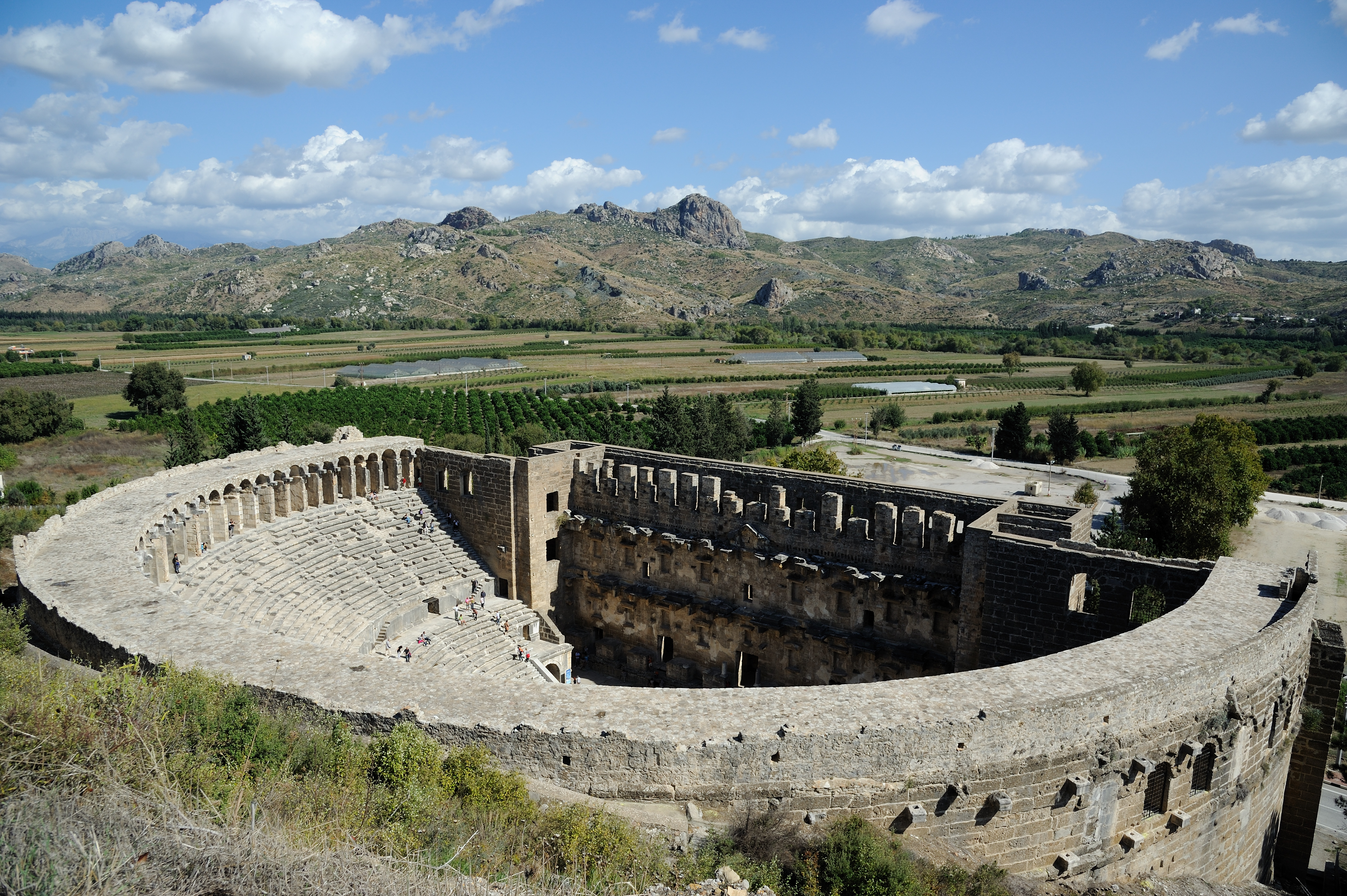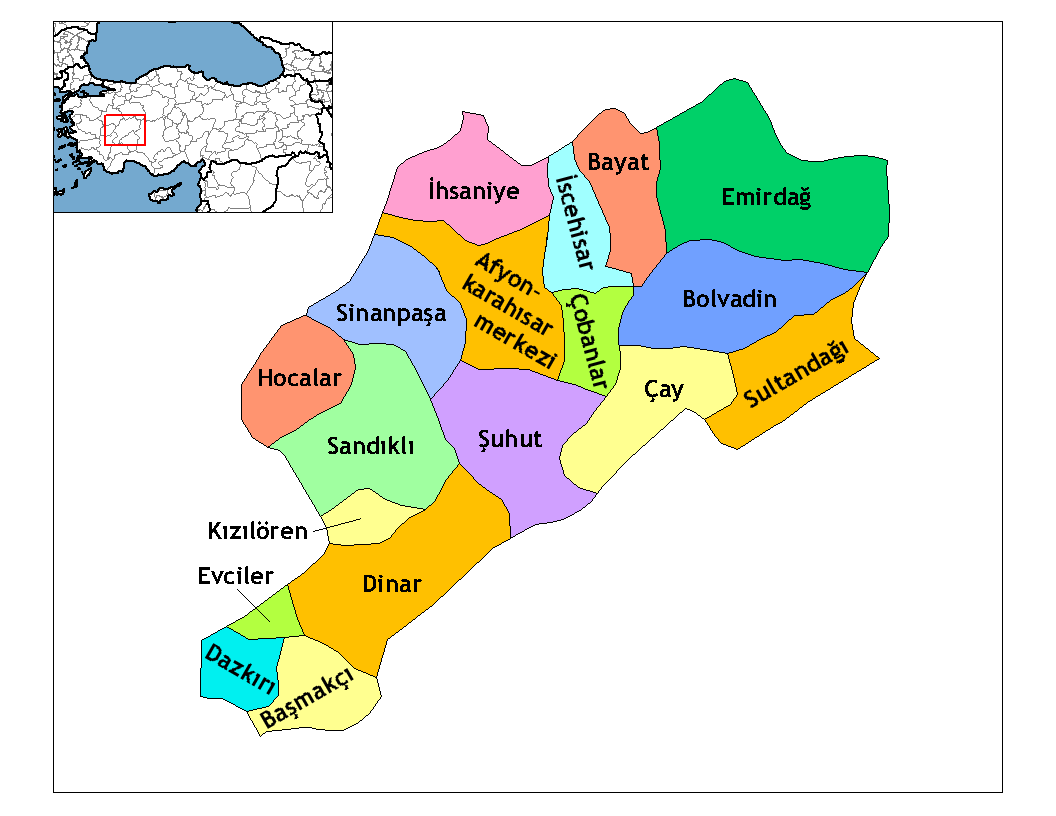|
─░brad─▒
─░brad─▒ is a municipality and district of Antalya Province, Turkey. Its area is 778 km2, and its population is 2,875 (2022). ─░brad─▒ is a high plain in the Taurus Mountains. In summer the weather is dry and cooler than the nearby Mediterranean coast with a daytime temperature of 30 degrees C and 10 degrees C at night. The mountains are covered with forests of juniper, cedar and pine, watered by mountain streams that eventually form the Manavgat River. The people of ─░brad─▒ mainly live from grazing goats on the hillsides and from forestry; there is no commercial farming although people have gardens, vineyards and fruit trees. History This area was once part of the antique kingdom of Pisidia, near the river Melas. It is unclear however when the district was first settled. In the Turkish period the area was an important passage over the Taurus Mountains for traders from the Mediterranean, and was used as a summer retreat from the heat on the coast. There are the foundatio ... [...More Info...] [...Related Items...] OR: [Wikipedia] [Google] [Baidu] |
Antalya Province
Antalya Province () is a Provinces of Turkey, province and Metropolitan municipalities in Turkey, metropolitan municipality of Turkey. It is located on the Mediterranean Region, Turkey, Mediterranean coast of south-west Turkey, between the Taurus Mountains and the Mediterranean Sea. Its area is 20,177 km2, and its population is 2,688,004 (2022). Antalya Province is the centre of Turkey's tourism industry, attracting 30% of foreign tourists visiting Turkey. Its capital city of the same name was the world's third most visited city by number of international arrivals in 2011, displacing New York City, New York. Antalya is Turkey's biggest international Resort town, sea resort. The province of Antalya corresponds to the lands of ancient Lycia to the west, Pamphylia to the east, and part of Pisidia to the north. It features a shoreline of with beaches, ports, and ancient cities scattered throughout, including the World Heritage Site Xanthos. The provincial capital is Antalya ci ... [...More Info...] [...Related Items...] OR: [Wikipedia] [Google] [Baidu] |
Erymna
Erymna () or Orymna () was a town in ancient Pamphylia or Lycia. The form "Orymna" is that given in the ''Synecdemus'' and the ''Notitiae Episcopatuum''. and in the ecumenical councils, but inscriptions found on the site show that the inhabitants used the form with "E". Stephanus of Byzantium stated that the form used in the ''Lyciaca'' of Alexander Polyhistor was Erymnae (). The modern name of the site is Ormana, reflecting the ancient name. Site Little remains of the town. Apart from the foundations of a colonnaded building and a single sarcophagus, only some architectural stones are to be found at Ormana. History The town may have earlier been a member of the Kentenneis tribe, but it is known only as a normal independent Greek city. It never issued coinage. Bishopric As a Christian bishopric, Orymna was a suffragan see of Side, the capital and metropolitan see of the Roman province of Pamphylia Prima. Its bishop Paulus took part in the Council of Ephesus in 431. ... [...More Info...] [...Related Items...] OR: [Wikipedia] [Google] [Baidu] |
Districts Of Turkey
The Provinces of Turkey, 81 provinces of Turkey are divided into 973 districts (''il├¦eler''; sing. ''il├¦e''). In the Ottoman Empire and in the early Turkish Republic, the corresponding unit was the ''qadaa, kaza''. Most provinces bear the same name as their respective provincial capital (political), capital districts. However, many urban provinces, designated as greater municipalities, have a center consisting of multiple districts, such as the provincial capital of Ankara Province, Ankara province, Ankara, The City of Ankara, comprising nine separate districts. Additionally three provinces, Kocaeli, Sakarya, and Hatay have their capital district named differently from their province, as ─░zmit, Adapazar─▒, and Antakya respectively. A district may cover both rural and urban areas. In many provinces, one district of a province is designated the central district (''merkez il├¦e'') from which the district is administered. The central district is administered by an appointed pr ... [...More Info...] [...Related Items...] OR: [Wikipedia] [Google] [Baidu] |
Taurus Mountains
The Taurus Mountains (Turkish language, Turkish: ''Toros Da─¤lar─▒'' or ''Toroslar,'' Greek language, Greek'':'' ╬ż╬▒ŽŹŽü╬┐Žé) are a mountain range, mountain complex in southern Turkey, separating the Mediterranean Sea, Mediterranean coastal region from the central Anatolia#Anatolian plateau, Anatolian Plateau. The system extends along a curve from Lake E─¤irdir in the west to the upper reaches of the Euphrates and Tigris rivers in the east. It is a part of the Alpide belt in Eurasia. Etymology The mountain range under the current name was mentioned in The Histories (Polybius), ''The Histories'' by Polybius as ╬ż╬▒ß┐”Žü╬┐Žé (''Ta├╗ros''). Heinrich Kiepert writes in ''Lehrbuch der alten Geographie'' that the name was borrowed into Ancient Greek from the Semitic languages, Semitic (Old Aramaic) root wikt:ūśūĢū©ūÉ, ūśūĢū©ūÉ (''ß╣Ł┼½r─ü''), meaning "mountain". Geography The Taurus Mountains are divided into three chains from west to east as follows; * Western Taurus (Bat─▒ Torosla ... [...More Info...] [...Related Items...] OR: [Wikipedia] [Google] [Baidu] |
Mediterranean
The Mediterranean Sea ( ) is a sea connected to the Atlantic Ocean, surrounded by the Mediterranean basin and almost completely enclosed by land: on the east by the Levant in West Asia, on the north by Anatolia in West Asia and Southern Europe, on the south by North Africa, and on the west almost by the MoroccoŌĆōSpain border. The Mediterranean Sea covers an area of about , representing 0.7% of the global ocean surface, but its connection to the Atlantic via the Strait of GibraltarŌĆöthe narrow strait that connects the Atlantic Ocean to the Mediterranean Sea and separates the Iberian Peninsula in Europe from Morocco in AfricaŌĆöis only wide. Geological evidence indicates that around 5.9 million years ago, the Mediterranean was cut off from the Atlantic and was partly or completely desiccated over a period of some 600,000 years during the Messinian salinity crisis before being refilled by the Zanclean flood about 5.3 million years ago. The sea was an important rout ... [...More Info...] [...Related Items...] OR: [Wikipedia] [Google] [Baidu] |
Manavgat
Manavgat is a municipality and district of Antalya Province, Turkey. Its area is 2,351 km2, and its population is 252,941 (2022). It is from the city of Antalya. The Manavgat River has a waterfall near the city. Geography Between the Taurus Mountains to the north, and the sandy beaches of the Mediterranean coast, much of the district is surrounded by a flat plain. This is mostly fertile farmland and agriculture is well-developed in Manavgat, keeping livestock and growing crops including grains, sesame and many fruits and vegetables; in recent years olives have also been planted. There is no industry except for food-processing, so apart from agriculture the local economy depends on tourism. The mountains are covered with forests and typical Mediterranean shrubs, there are small plains higher in the mountains too, traditionally used for summer grazing by the y├Čr├╝k nomads. Manavgat has a Mediterranean climate of hot, dry summers and warm, wet winters; the temperature ra ... [...More Info...] [...Related Items...] OR: [Wikipedia] [Google] [Baidu] |
Pisidia
Pisidia (; , ; ) was a region of ancient Asia Minor located north of Pamphylia, northeast of Lycia, west of Isauria and Cilicia, and south of Phrygia, corresponding roughly to the modern-day province of Antalya in Turkey. Among Pisidia's settlements were Antioch in Pisidia, Termessos, Cremna, Sagalassos, Etenna, Neapolis, Selge, Tyriacum, Laodiceia Katakekaumene, Adada (Pisidia) and Philomelium. Geography Although Pisidia is close to the Mediterranean Sea, the warm climate of the south cannot pass the height of the Taurus Mountains. The climate is too dry for timberland, but crop plants grow in areas provided with water from the mountains, whose annual average rainfall is c. 1000 mm on the peaks and 500 mm on the slopes. This water feeds the plateau. The Pisidian cities, mostly founded on the slopes, benefited from this fertility. The irrigated soil is very suitable for growing fruit and for husbandry. History Early history The area of Pisidia has ... [...More Info...] [...Related Items...] OR: [Wikipedia] [Google] [Baidu] |
Manavgat River
Manavgat River originates on the eastern slopes of Western Taurus Mountains in Turkey. In ancient times it was called Melas (). At an elevation of 1,350 m, the outflow of several small springs joins together to become the headwaters of the Manavgat. The largest of these springs is called Dumanli, whose name means "place where there is fog", because of the dense mist that forms above the spring. In addition to the springs from the Taurus Mountains, the Manavgat is also fed underground from large lakes to the north of the mountains, on the Anatolian Plateau. Pliny the Elder considered that the river was the boundary between ancient Pamphylia and Cilicia. From there, the river flows south over conglomerated strata for about 90 km, descending through a series of canyons. Finally, it washes over the Manavgat Waterfall and through the coastal plain and into the Mediterranean Sea. There are many caves in the river watershed area, the most interesting being the Alt─▒nbe┼¤ik cave. ... [...More Info...] [...Related Items...] OR: [Wikipedia] [Google] [Baidu] |
TÜİK
Turkish Statistical Institute (commonly known as TurkStat; or TÜİK) is the Turkish government agency commissioned with producing official statistics on Turkey, its population, resources, economy, society, and culture. It was founded in 1926 and headquartered in Ankara. Formerly named as the State Institute of Statistics (Devlet İstatistik Enstitüsü (DİE)), the institute was renamed as the Turkish Statistical Institute on November 18, 2005. See also * List of Turkish provinces by life expectancy References External linksOfficial website of the institute National statistical services Statistical Organizations established in 1926 Organizations based in Ankara {{Sci-org-stub ... [...More Info...] [...Related Items...] OR: [Wikipedia] [Google] [Baidu] |
Mahalle
is an Arabic word variously translated as district, quarter, ward, or neighborhood in many parts of the Arab world, the Balkans, Western Asia, the Indian subcontinent, and nearby nations. History Historically, mahallas were autonomous social institutions built around familial ties and Islamic rituals. Today it is popularly recognised also by non-Muslims as a neighbourhood in large cities and towns. Mahallas lie at the intersection of private family life and the public sphere. Important community-level management functions are performed through mahalle solidarity, such as religious ceremonies, life-cycle rituals, resource management and conflict resolution. It is an official administrative unit in many Middle Eastern countries. The word was brought to the Balkans through Ottoman Turkish ''mahalle'', but it originates in Arabic ┘ģžŁ┘äž® (''m├żhall├ż''), from the root meaning "to settle", "to occupy". In September 2017, a Turkish-based association referred to the historical mahalle ... [...More Info...] [...Related Items...] OR: [Wikipedia] [Google] [Baidu] |
Hellenistic
In classical antiquity, the Hellenistic period covers the time in Greek history after Classical Greece, between the death of Alexander the Great in 323 BC and the death of Cleopatra VII in 30 BC, which was followed by the ascendancy of the Roman Empire, as signified by the Battle of Actium in 31 BC and the Roman conquest of Ptolemaic Egypt the following year, which eliminated the last major Hellenistic kingdom. Its name stems from the Ancient Greek word ''Hellas'' (, ''Hell├Īs''), which was gradually recognized as the name for Greece, from which the modern historiographical term ''Hellenistic'' was derived. The term "Hellenistic" is to be distinguished from "Hellenic" in that the latter refers to Greece itself, while the former encompasses all the ancient territories of the period that had come under significant Greek influence, particularly the Hellenized Middle East, after the conquests of Alexander the Great. After the Macedonian conquest of the Achaemenid Empire in ... [...More Info...] [...Related Items...] OR: [Wikipedia] [Google] [Baidu] |




